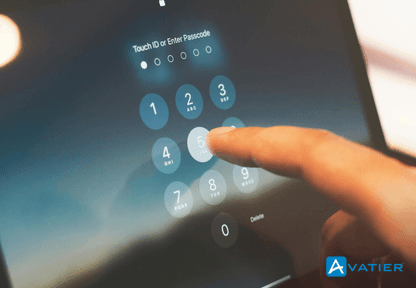August 17, 2025 • Mary Marshall
HIPAA Violations: The Hidden Catalyst Driving Enterprise IT Transformation in 2025
Discover how rising HIPAA violations drive identity innovation—and why healthcare chooses Avatier’s AI solutions for compliance.
HIPAA violations aren’t just compliance issues—they’re becoming the unexpected catalyst for wholesale IT transformation. With penalties reaching $1.9 million per violation category and OCR enforcement actions increasing by 25% year-over-year, healthcare organizations are fundamentally rethinking their approach to identity and access management (IAM).
The Escalating Crisis of HIPAA Non-Compliance
Healthcare organizations face a perfect storm of challenges. Data breaches in healthcare reached an all-time high in 2023, with a staggering 592 reported incidents affecting over 112 million individuals. The average cost of a healthcare data breach now stands at $10.93 million—significantly higher than any other industry.
The root causes consistently point to identity-related vulnerabilities:
- Inappropriate access: 58% of healthcare security incidents involve privileged access misuse
- Outdated provisioning: 45% of organizations admit to having orphaned accounts that remain active for 30+ days after employee departure
- Password vulnerabilities: 23% of healthcare breaches originate from compromised credentials
What’s particularly alarming is that 63% of HIPAA violations stem from preventable identity management failures. The consequences extend beyond financial penalties to include damaged patient trust, loss of business partnerships, and increased scrutiny from regulators.
HIPAA Compliance: The Identity Management Imperative
Healthcare organizations increasingly recognize that HIPAA compliance is fundamentally an identity management challenge. The regulation’s core requirements—access controls, audit controls, integrity controls, and transmission security—all depend on robust identity infrastructure.
This has led to an industry-wide reevaluation of legacy IAM approaches. According to a recent survey of healthcare CISOs, 78% identified IAM modernization as their top compliance priority for 2025, ahead of network security, endpoint protection, and cloud security.
“Traditional approaches to healthcare IAM often fall short because they were designed for a different era—one with clearer network boundaries and simpler access patterns,” explains Dr. Sarah Jenkins, healthcare cybersecurity researcher. “Today’s healthcare organization needs identity solutions built specifically for hybrid environments with complex compliance requirements.”
Why Traditional IAM Approaches Fall Short for HIPAA
HIPAA’s Security Rule establishes stringent requirements for protecting electronic protected health information (ePHI). Yet many healthcare organizations struggle with compliance despite significant investments in security infrastructure. The gap often traces back to fundamental IAM shortcomings:
- Fragmented identity systems: The average healthcare organization uses 15+ disconnected identity stores, making consistent policy enforcement nearly impossible
- Manual provisioning processes: 67% of healthcare IT teams still rely on partially manual user provisioning, introducing delays and human error
- Limited visibility: Only 34% of healthcare organizations can produce comprehensive access audit reports within 24 hours
- Inadequate privilege management: 71% report struggles maintaining least-privilege access in clinical environments
These challenges are compounded by healthcare’s unique operational requirements—24/7 availability, clinical workflows that can’t tolerate friction, and an increasingly distributed workforce accessing sensitive systems from multiple locations and devices.
The New Identity Paradigm for HIPAA Compliance
Forward-thinking healthcare organizations are embracing a new identity management paradigm that places HIPAA HITECH compliance at the center of their security architecture. This approach is characterized by:
1. Unified Identity Governance
Modern HIPAA compliance requires a unified approach to identity governance that bridges siloed systems. Healthcare organizations need comprehensive visibility across all access points—whether clinical applications, administrative systems, or cloud resources.
The most effective solutions provide:
- Centralized identity lifecycle management from onboarding through offboarding
- Automated access certification reviews aligned with HIPAA requirements
- Continuous compliance monitoring with real-time alerts for policy violations
- Integrated risk scoring to identify high-risk access patterns
2. Zero-Trust Architecture for Clinical Environments
Traditional perimeter-based security has proven inadequate for protecting ePHI in today’s distributed healthcare environment. Zero-trust approaches—which verify every access request regardless of source—are becoming the new standard.
An effective zero-trust implementation for healthcare requires:
- Contextual authentication based on user, device, location, and behavior
- Just-in-time access provisioning for clinical systems
- Continuous session monitoring with risk-based step-up authentication
- Granular, attribute-based access control for ePHI resources
3. AI-Powered Identity Intelligence
The complexity of modern healthcare environments has outpaced human capacity for effective access management. AI and machine learning are emerging as critical tools for maintaining HIPAA compliance at scale.
The most impactful applications include:
- Anomalous access detection that identifies potential inappropriate PHI access
- Predictive access modeling that suggests appropriate entitlements
- Automated segregation of duties enforcement for clinical roles
- Intelligent identity verification for high-risk transactions
4. Frictionless, Self-Service Experience
Healthcare providers operate under intense time pressure, and security measures that introduce friction face resistance. Modern identity solutions must balance rigorous HIPAA compliance with frictionless user experiences.
Key capabilities include:
- Clinical workflow-aware authentication that minimizes disruption
- Self-service access requests with automated approval workflows
- Password management designed for clinical environments
- Mobile-first experiences that support modern healthcare delivery
Avatier: Purpose-Built Identity Management for HIPAA Compliance
While many IAM vendors claim healthcare capabilities, Avatier stands apart with purpose-built solutions for HIPAA compliance. Unlike generic approaches from vendors like Okta or SailPoint, Avatier’s Identity Anywhere platform was designed from the ground up to address healthcare’s unique compliance challenges.
Key differentiators include:
1. Healthcare-Specific Compliance Automation
Avatier’s compliance automation capabilities directly address HIPAA’s most challenging requirements:
- Section 164.308(a)(3): Automated workforce security processes ensure appropriate access authorization
- Section 164.308(a)(4): Comprehensive access management workflows enforce information access privileges
- Section 164.312(a)(1): Technical safeguards automatically restrict access to authorized users
- Section 164.312(b): Immutable audit controls record all identity activities affecting ePHI
This built-in compliance mapping dramatically simplifies audit preparation and reporting.
2. Clinical Workflow Integration
Unlike generalist IAM platforms, Avatier’s solutions integrate seamlessly with healthcare-specific workflows:
- Native connectors for major EHR systems including Epic, Cerner, and Allscripts
- Role-based access control templates aligned with clinical job functions
- Emergency access protocols for break-glass scenarios
- Segregation of duties enforcement for controlled substances
3. Unified Compliance Dashboard
Avatier provides healthcare compliance officers with comprehensive visibility through:
- Real-time HIPAA compliance scoring
- Automated documentation of administrative, physical, and technical safeguards
- Evidence collection for OCR audits
- Remediation tracking for identified compliance gaps
4. AI-Driven Identity Intelligence
Avatier’s AI capabilities provide particularly strong value for healthcare organizations:
- Clinical role mining that identifies appropriate access patterns
- Behavior-based anomaly detection specific to healthcare workflows
- Risk-based authentication that adapts to clinical contexts
- Intelligent access certification that highlights high-risk entitlements
The ROI of HIPAA-Focused Identity Transformation
Healthcare organizations implementing Avatier’s HIPAA-focused identity solutions typically report compelling returns:
- 40% reduction in identity-related security incidents
- 65% decrease in manual access provisioning efforts
- 90% improvement in access certification completion rates
- 73% faster user access provisioning for clinical systems
Beyond these operational metrics, organizations report significant improvements in their overall HIPAA compliance posture and audit readiness.
Dr. Michael Chen, CISO at Metropolitan Health System, notes: “After implementing Avatier’s identity solution, our most recent HIPAA audit went from a weeks-long fire drill to a routine demonstration of our continuous compliance capabilities. The auditors were particularly impressed with our ability to produce comprehensive access reports and demonstrate our automated controls.”
Building Your HIPAA Identity Transformation Roadmap
For healthcare organizations ready to leverage identity management as their HIPAA compliance foundation, Avatier recommends a phased approach:
Phase 1: Compliance Assessment and Identity Consolidation
Begin by conducting a comprehensive assessment of your current identity infrastructure against HIPAA requirements. Identify fragmented identity repositories and create a plan for consolidation. Establish baseline metrics for your current HIPAA compliance posture.
Phase 2: Automated Lifecycle Management Implementation
Implement automated user provisioning and deprovisioning workflows aligned with HIPAA requirements. Develop role-based access control models appropriate for your clinical environment. Integrate with HR systems to ensure access changes are automatically triggered by employment status changes.
Phase 3: Self-Service and Governance Capabilities
Deploy self-service access request and password management capabilities. Implement automated access certification processes. Configure compliance dashboards to provide real-time visibility into your HIPAA posture.
Phase 4: Advanced AI and Zero-Trust Implementation
Implement AI-powered identity intelligence capabilities to detect anomalous access patterns. Deploy contextual authentication based on risk factors. Establish just-in-time privileged access management for administrative systems.
Conclusion: Identity as the Foundation of Healthcare Transformation
HIPAA violations have become an unexpected catalyst for IT transformation in healthcare, with identity management emerging as the critical foundation. Forward-thinking organizations recognize that compliance challenges provide the perfect opportunity to modernize their entire approach to security.
By implementing healthcare-specific identity solutions like Avatier’s Identity Management Architecture, organizations can simultaneously strengthen HIPAA compliance, improve operational efficiency, and enhance patient care through secure, frictionless access.
The healthcare organizations that thrive in this changing landscape will be those that recognize HIPAA compliance not as a checkbox exercise, but as an opportunity to fundamentally transform how they manage identity and access—creating a foundation for secure innovation in the years ahead.
As healthcare continues its digital transformation journey, one thing is clear: identity has become the new perimeter, and organizations that master identity management will be best positioned for both compliance and competitive advantage.









